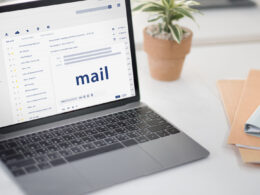Email personalization has come a long way. In the early days of email marketing, it was enough to simply send an email in order to get results. Today, the shotgun approach doesn’t work. Research shows that 52 percent of consumers are willing to walk from a brand or product if they don’t get personalized messages.
When it comes to personalization, it’s not just about inserting the recipient’s name or business into the email. There is a delicate balance between delivering targeted, personalized messages that drive engagement and overly familiar messages that can turn a customer off.
The key is to think of personalized customer emails in terms of having a conversation. When you talk to a person, it’s OK to address them by their name. It’s OK to wish them well on their birthday. It may be OK to reach out with a product recommendation that you think they will love (if they’ve signed up for this type of communication). As long as you respect the boundaries of the conversation, you will come across as real and authentic.
Your ultimate marketing goal is to convert leads into customers, but you want to achieve that by creating a discussion and building a relationship with your audience through a conversational tone.
Entrepreneurs who use email to build personalized customer journeys can boost campaign results by average click-thru rates of 14 percent and conversions by 10 percent.
Related: How Personalization Can Help Set Your E-Commerce Startup Apart From the Competition
The role of AI and machine learning in email personalization
Artificial intelligence and machine learning offer marketers important advances in personalization. This includes automating and optimizing the best time of day to send an email, the frequency of mailings, and the content that’s most likely to convert a customer. This includes everything down to the writing style, which can be modified by AI on the fly.
AI can also be amazing for product recommendation emails. It’s interesting to know that as much as 35 percent of what’s purchased on Amazon and 75 percent of what’s watched on Netflix is drawn by AI-driven product recommendations.
Providing discounts and special offers could be optimized by AI, as well. For example, if AI discovers a certain pattern that makes a customer more susceptible to a certain kind of an offer, you could then set up a marketing automation workflow to deliver that campaign.
New email regulations impact personalization
It’s been almost a year since GDPR went into effect and many marketers were concerned that the new EU regulation would affect the way we use email. However, since GDPR came into force, we see little to no impact on the average statistics, like the opens, clicks, unsubscribes, or the spam complaint rates. At the same time, we’re seeing marketers are using double opt-in more often and they pay even more attention to their customers’ preferences.
Now that the GDPR dust has begun to settle, we can expect to see better, more relevant campaigns and happier consumers who know that they have a vote and that their marketing consents are being respected.
Another regulation, the California Consumer Privacy Act (CCPA) goes into effect in January 2020, and entrepreneurs who utilize email marketing tactics should be aware of this policy. In essence, CCPA is a model similar to Europe’s GDPR. The trend of empowering the consumer by data privacy protections is flourishing globally, and CCPA is a prime example.
Just like GDPR applies not just to EU companies, but globally to all companies that offer their services to European customers, CCPA will have a global impact, as well. All companies who wish to generate revenue in California (the fifth largest economy in the world) will need to pay attention to CCPA laws.
For entrepreneurs, the first step is to review the way you process personal data and your startup’s privacy policies. Select a contact person within your organization or hire a third-party contractor who will help you address data protection requests. Last but not least, carefully choose which service providers you use and make sure they are compliant with CCPA.
Sign Up: Receive the StartupNation newsletter!
Personalization helps startups grow faster
While a startup may not be able to spend millions of dollars on ad campaigns, they can and should invest their time to build marketing variants and run experiments. Every startup can benefit from good A/B testing.
However, you must regularly test campaigns and marketing experiments to examine which variants are performing best. This includes testing everything from headlines to images to subject lines to copywriting styles.
Email marketing and marketing automation help small businesses grow faster, and these types of campaigns can deliver massive ROI. It’s something you really can’t do without, especially if you’re a startup on a shoestring budget.






